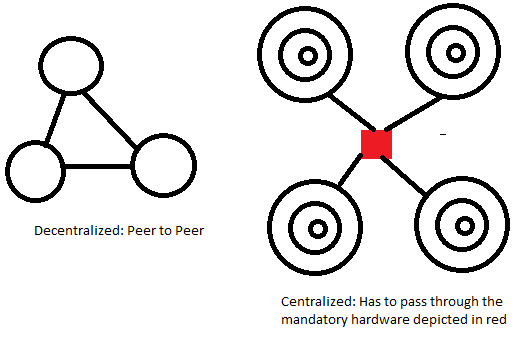Centralized vs Decentralized Internet
Decentralized Internet can be identified using peer to peer connections rather than using a single point network access. The major difference between centralized and decentralized Internet is that the latter connects to different points (peers: other computers, printers, scanners, servers etc) without having to go through a mandatory point. There is no fixed network topology here. In fact, none of the network topologies, I learned so far, belong to decentralized Internet. Coming to Centralized Internet, there is a mandatory centralized point (hardware). It is mostly a server as in client-server models. It can also be a hub or something through which, all the data on the network must pass. This model is an example of the current Internet state. You can find smaller networks inside bigger networks in a way that anyone wanting to snoop on the data can do so easily. For example, all data coming into the US or going out has to go through certain servers. This facilitates audit and scanning of the data whenever NSA or likes want. In a decentralized model, at most the ISP can gather data on the net. In the current centralized model, since the data is made to pass through certain points, anyone with authority can scan the data.
Why Centralized Model for Internet?
By now, you know that the main benefits of a centralized Internet are government authorities that can spy on the common but mandatory points through which data has to pass before it goes to the recipients. You can deduce that policymakers insisted on creating and promoting this model so that they can keep better control of the Internet and its users. At its current size, a decentralized Internet would mean something worse than TOR where data is almost not trackable. I heard the security agencies have now devised methods to decode data paths for TOR too. Maybe decentralized Internet too would have met the same fate but why make it complex if it is possible to simply track few mandatory hardware to control everything? Look at the WhatsApp communication app. It functions better on the centralized model. If WhatsApp was decentralized, your message would just be jumping up and down your network node and recipient until the recipient comes online. There are high chances of it becoming corrupt and thus lost (data). But since they use centralized model, the message stays on the server until the recipient comes online. Whatsapp is just a small example of the huge network called Internet. The centralized model is useful to government authorities and also in reducing data loss. But there are groups that want decentralization and protest to unchain the required hardware so that the freedom of expression will be better. However, my view is that the decentralized model will create independently encrypted groups that won’t be visible to others outside these groups, making it dangerous to many. Already anti-social elements use the centralized models without many hassles thanks to proxies, cryptography, and similar technologies. While it provides more freedom, the decentralized Internet will make it very hard to trace unhealthy activities.

